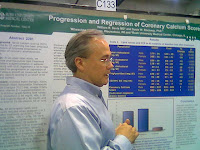An extraordinary thing happened about 2 1/2 years ago.
While we have been following the Track Your Plaque program for coronary plaque regression for nearly 10 years, about 2 1/2 years ago we witnessed an extraordinary surge in success--bigger, faster, and more frequent drops in heart scan scores.
Up until then, we did witness significant reversal of coronary plaque by heart scan scores. We were planning to publish the data to validate this approach, but then . . .
Heart scan scores starting dropping not just 2%, or 8% . . . but 24%, 30%, 50% and more. Why? I attribute the surge in success to the addition of vitamin D .
Unfortunately, it also meant that the preceding 8 or so years of data lacked experience with supplementing vitamin D. The hundreds of participants in the Track Your Plaque program had not, until then, included vitamin D in their program.
So I decided to start from scratch (from the standpoint of data collection, not for the participants). That also meant that the preceding years of experience went unreported, though even that data far exceeded the results of what is achieved in conventional heart disease prevention.
Thus, the data I presented at the Experimental Biology Proceedings (FASEB 2008) in San Diego this week included only experiences in the group of participants that included vitamin D in their program, with data collected until mid-2007. The number of experiences is therefore modest.
However, the Track Your Plaque experience, as reported, far exceeds any prior experience in coronary plaque regression.
The full abstract will be published in the Track Your Plaque website.
Copyright 2008 House, MD